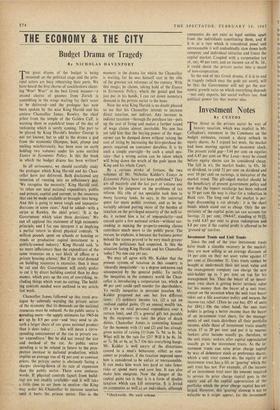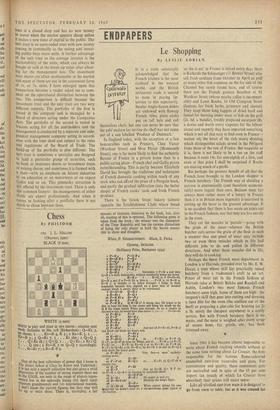Investment Notes
By CUSTOS
Ttie threat to the private sector by way of heavier taxation, which was implicit in Mr. Callaghan's statement in the Commons on 'the budget estimates, caused a sharp setback in equity shares. As I argued last week, the market had been moving against the economic clock. The present yield gap-5.44 per cent on equities and 6.45 per cent on War Loan—must be closed before equity shares can be considered cheap. The fall in ict, the market leader, to 45s. 3d. ex dividend, to yield 51 per cent on dividend and over 10 per cent on earnings, is indicative of the market trend. The gilt-edged market should be the beneficiary of present government policy and now that the import surcharge has been reduced to 10 per cent the way is clear for a reduction in Bank rate. The long end of the market is per- haps discounting a cut already: it is the short bonds which stand out as cheap. Only the un- certainty of the capital gains tax can account for Savings 21 per cent, 1964-67, standing at 91ii, to yield 6.65 per cent to gross redemption and 8.8 per cent if the capital profit is allowed to be 'grossed up' tax-free.
Investment Trusts and Unit Trusts
Since the end of the year investment trusts have made a sizeable recovery in the market; they are now selling at an average discount of 14 per cent on their net asset value against 17 per cent at December 31. Unit trusts cannot be bought at underneath their net asset value and the management company can charge the new unit-holder up to 5 per cent on top for his management fee. Thus the buyer of an invest- ment trust share is getting better intrinsic value for his money than the buyer of a unit trust, except on the occasion when the unit trust buyer takes out a life assurance policy and secures the income-tax relief. (Then he can buy £93 of units for £84-1.) On the other hand, the unit trust holder is getting a better income than the buyer of an investment trust share, for the manage- ments of unit trusts distribute all their portfolio income. while those of investment trusts usually retain 15 to 20 per cent and put it to reserve. Seekers after income usually go, therefore, to the unit trusts; seekers after capital appreciation usually go to the investment trusts. As the in- vestment trusts can raise prior charge capital by way of debenture stock or preference shares. which a unit trust cannot do, the equity of an investment trust has a lift or 'gearing' which the unit trust has not. For example, all the income of an investment trust over the amount required to service its prior charge capital goes to the equity and all the capital appreciation of the portfolio which the prior charge capital has en- larged. However, this 'gearing' element is not so valuable as it might appear, for the investment trust is a closed shop and has no new money to invest when the market appears cheap unless it makes a new issue of capital to the public. The unit trust is an open-ended trust with new money coming in continually as the saving and invest- ing public buys more units. A further advantage of the unit trust to the average investor is the marketability of the units, which can always be bought or sold at the break-up value after allow- ing for the management fees. The investment trust shares are often unobtainable in the market and many of them are not in the convenient form of Is. or 5s. units. I have enlarged upon this comparison because a reader asked me to com- ment on the operational distinction between the two. The comparison is difficult because the investment trust and the unit trust are two very different animals. The portfolio of the first is vested in the company and is managed by a board of directors acting under the Companies Acts. The portfolio of the second is vested in trustees acting for all the unit-holders and the management is conducted by a separate and inde- pendent management company acting in accord- ance with the trust deed and subject to the rules and regulations of the Board of Trade. The build-up of the portfolio is also different. The link trust is sometimes a specialist one designed to hold a particular group of securities, such as bank or insurance shares or investment trusts or mining shares, and sometimes it is formed with a slant—with an emphasis on leisure industries or on education or on motorways or on export tfades and so on. This gimmicky attraction is not offered by the investment trust. There is only one common feature : the managements of either stable are expert professionals. And when it comes to looking after a portfolio there it not ntuch to chose between them. •



































 Previous page
Previous page